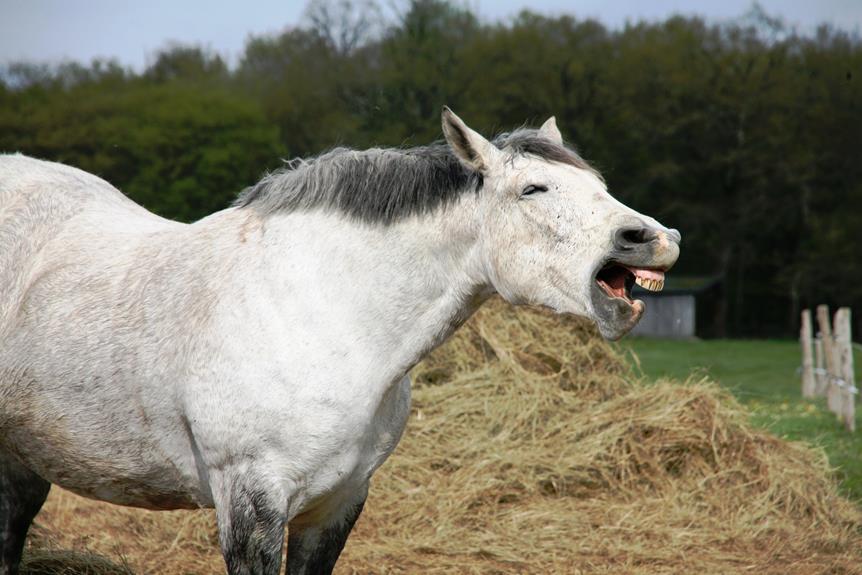Are you curious about whether horses can enjoy a delicious slice of cantaloupe?
Well, let me tell you, it's quite an intriguing question that has sparked much debate among equine enthusiasts. While horses are known for their love of hay and grains, the idea of them munching on a juicy piece of fruit may seem rather unconventional.
However, there are some interesting factors to consider that might just surprise you.
So, saddle up and get ready to explore the world of horses and cantaloupes. You won't want to miss what we uncover!
Key Takeaways
- Cantaloupe provides essential vitamins and minerals for horses' overall health and well-being.
- Feeding cantaloupe rinds is not recommended due to potential mold and digestive issues.
- Remove the seeds as they can pose a choking hazard to horses.
- Cantaloupe should be given as an occasional snack, not a daily staple, and moderation is key due to its natural sugar content.
Nutritional Benefits of Cantaloupe for Horses
Horses can greatly benefit from the nutritional advantages of cantaloupe, as it provides essential vitamins and minerals for their overall health and well-being. When it comes to feeding cantaloupe to horses, it's important to understand the nutritional benefits it offers.
Cantaloupe is packed with vitamins and minerals that are necessary for strong bones, healthy skin and hair, and a healthy heart. It contains potassium, which is essential for skeletal and cell health. Additionally, cantaloupe is a good source of folic acid, which helps maintain red blood cell counts in horses. The presence of beta carotene in cantaloupe supports healthy eye function in horses. Furthermore, cantaloupe contains thiamine, which aids in proper fat metabolism.
These nutritional benefits make cantaloupe a great addition to a horse's diet. However, it's important to remember that cantaloupe should be fed in moderation and as part of a balanced diet. Always consult with a veterinarian or equine nutritionist before incorporating cantaloupe into your horse's feeding routine.
Feeding Cantaloupe Rinds to Horses
Feeding cantaloupe rinds to horses isn't recommended due to potential mold and digestive issues. Mold on the rinds may not be visible, and this can lead to stomach and digestive problems for horses. Ingesting rinds can also result in fungal infections, digestive damage, and even laminitis, a painful hoof condition.
While horses can eat cantaloupe, it's important to be cautious about what parts of the fruit you feed them. Although cantaloupe can help provide some nutritional value to horses, the rinds can pose a risk to their health.
To avoid these potential issues, it's best to discard the rinds and only feed your horses small pieces of the flesh. This will ensure that they receive the nutritional benefits of cantaloupe without the choking hazard and potential harm associated with the rinds.
Horses and Cantaloupe Seeds
When offering cantaloupe to your horses, it's important to remove the seeds as they can pose a choking hazard. Horses can eat watermelon, which is in the same family as cantaloupe, but it's best to err on the side of caution when it comes to cantaloupe seeds.
Horses love cantaloupe, and it can be a tasty and nutritious addition to their diet. Cantaloupe is rich in vitamins A and C, as well as potassium and fiber. It's also low in calories, making it a healthy option for horses.
However, the seeds of cantaloupe can be large and hard, making them difficult to chew and swallow. To ensure the safety of your horse, always remove the seeds before feeding them cantaloupe. Cut the cantaloupe into small, bite-sized pieces to further reduce the risk of choking.
Remember to introduce this fruit slowly into your horse's diet and consider their specific dietary needs and any health conditions they may have. Feeding your horse a variety of fruits and vegetables, including cantaloupe, can be a great way to provide them with essential nutrients and keep their diet interesting.
Proper Way to Feed Cantaloupe to Horses
To properly incorporate cantaloupe into your horse's diet, follow these guidelines for safe and balanced feeding.
Cantaloupe flesh is a healthy snack for horses, providing essential vitamins and minerals that support red blood cell health and boost their immunity. However, due to its natural sugar content, it should be fed in moderation.
In hot weather, cantaloupe can be a refreshing treat for your horse. To ensure easy digestion and prevent choking, cut the cantaloupe into small, bite-sized pieces.
Remember that cantaloupe should be given as an occasional snack, not a daily staple. If your horse is insulin-resistant, overweight, or prone to founder, it's crucial to have a restricted diet, which includes limited treats like cantaloupe.
Special Considerations for Feeding Cantaloupe to Horses
To ensure the safe feeding of cantaloupe to horses, there are several special considerations to keep in mind.
First and foremost, remember that moderation is key when giving your horses cantaloupe. While it can be a tasty and refreshing treat, the natural sugars present in cantaloupe can lead to excessive sugar intake if fed in large quantities.
Next, it's crucial to remove the rind and seeds before offering cantaloupe to your horses. Not only can the rind and seeds cause digestive issues, but they also pose a potential choking hazard. This is especially important for horses with dental issues, such as senior horses, to prevent any choking incidents.
Additionally, horses with diabetes or insulin resistance should have limited or no access to cantaloupe due to its high sugar content. It's essential to consider the specific dietary needs and health conditions of your horse before introducing cantaloupe into their diet.
Frequently Asked Questions
Is Cantaloupe Safe for Horses?
Yes, cantaloupe is safe for horses. It offers potential health benefits like antioxidants and boosts immunity. Introduce it gradually into their diet, considering their specific needs. Avoid excessive consumption due to sugar content. Remember, horses can't eat the rinds or seeds.
What Fruit Can Horses Not Eat?
Horses cannot eat grapes due to the dangers they pose. Oranges can have negative effects on their digestion. Bananas, pineapples, cherries, apples, and avocados also carry risks. Strawberries, however, can be safely consumed.
Can Horses Eat Melon Rind?
Yes, horses can eat melon rind, but it is not recommended. The rind may contain mold and can cause digestive issues. It's best to avoid feeding rinds and instead focus on introducing other types of melon or treats during training.
Can Horses Have Honeydew Melon?
Honeydew melon is safe for horses and can be a healthy treat. It provides essential vitamins and minerals, boosts immunity, and promotes overall health. Introduce it gradually, serve in moderation, and avoid rinds and seeds.
Conclusion
In conclusion, while horses can safely eat cantaloupe and enjoy its nutritional benefits, it should be fed in moderation. Removing the rind and seeds is important to prevent digestive issues and choking hazards.
Cantaloupe can be a tasty treat for horses, but it shouldn't be a daily staple in their diet. Remember to consider their overall dietary needs and consult with a veterinarian for proper feeding guidelines.



0 Comments